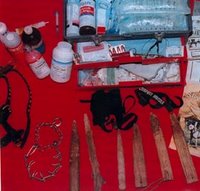Will the legislation stop dog fighting?
Pit bull ban won’t stop dog fighting, experts say
Jillian Van Acker
 Some of the items used in underground dog fighting
Some of the items used in underground dog fighting
Dog fighting is more of a problem in central and southwestern Ontario than the rest of the province, says the Society for the Protection of Cruelty against Animals.
Mike Draper, chief of investigations with the Ontario SPCA, attributes this to the proximity of Michigan where there is a significant problem.
The problem in Ontario
“The problem is that training dogs for fighting isn’t illegal, but fighting is,” says Draper. The prison time is more lengthy in the States for crimes against animals. Dog fighters travel across the border to Southwestern Ontario because the penalities are less severe.
The legislation being presented on a provincial level has a clause to make training illegal, but it’s limited, says Ed Small, manager of investigations with the London Humane Society.
“It’s restrictive to pit bulls,” says Small. “The legislation will make it illegal to train pit bulls to fight, but not other dogs.”
Pit bulls and mastiffs are the predominates but other dogs are used too, like the presa canario and dogo argentino.


 “If we target one breed, fighters will just switch," says Small. "It will make other dogs more aggressive.”
“If we target one breed, fighters will just switch," says Small. "It will make other dogs more aggressive.”
Another concern about the proposed pit bull ban is that it doesn’t address the punishments of offenders. The maximum penalty for dog fighting is either six months in jail or a $2000 fine.
“We really need to increase the severity (of the punishments),” says Small. “The biggest thing is to increase offences against animals and not just ban the training of pit bulls, but all dogs.”
According to Small, the main problem in the London area is younger groups of people dog fighting on a smaller scale. He says it’s been awhile since any arrests have been made, but there have been numerous investigations.
Aggressive dogs
While dogs used in fights are bred for aggression, Small says these dogs pose only a small threat to people.
“Those dogs are bred for aggression against other animals, not humans. Owners are usually in the ring with the dogs so that they can stop the fight and treat wounds,” says Small.
Cathy Crawford, branch manager of the Chatham-Kent SPCA, is concerned that aggressive dogs are getting out into the community.
“There is the concern that dogs bred for aggression have gotten away from their owners,” she says. “There’s also the issue of puppies. People contact breeders for puppies that have been bred specifically for aggression.”
Crawford says authorities became aware of the dog-fighting problem in the Chatham-Kent area around 1993. They started seeing wounds on some dogs and got phone calls about dead dogs that were being found in garbage bags or dumpsters.
“In 1998, with the assistance of police, we were able to execute a search warrant and found fighting dogs and paraphernalia for fighting,” says Crawford.
Crawford says there are still signs that dog fighting is an ongoing problem in the Chatham area, but it has mainly gone underground and is hard to get evidence. She’s worried the proposed legislation will only make things worse.
“People are going to still fight dogs, and it doesn’t address the issue of irresponsible owners."
Jillian Van Acker
 Some of the items used in underground dog fighting
Some of the items used in underground dog fightingDog fighting is more of a problem in central and southwestern Ontario than the rest of the province, says the Society for the Protection of Cruelty against Animals.
Mike Draper, chief of investigations with the Ontario SPCA, attributes this to the proximity of Michigan where there is a significant problem.
The problem in Ontario
“The problem is that training dogs for fighting isn’t illegal, but fighting is,” says Draper. The prison time is more lengthy in the States for crimes against animals. Dog fighters travel across the border to Southwestern Ontario because the penalities are less severe.
The legislation being presented on a provincial level has a clause to make training illegal, but it’s limited, says Ed Small, manager of investigations with the London Humane Society.
“It’s restrictive to pit bulls,” says Small. “The legislation will make it illegal to train pit bulls to fight, but not other dogs.”
Pit bulls and mastiffs are the predominates but other dogs are used too, like the presa canario and dogo argentino.


 “If we target one breed, fighters will just switch," says Small. "It will make other dogs more aggressive.”
“If we target one breed, fighters will just switch," says Small. "It will make other dogs more aggressive.”Another concern about the proposed pit bull ban is that it doesn’t address the punishments of offenders. The maximum penalty for dog fighting is either six months in jail or a $2000 fine.
“We really need to increase the severity (of the punishments),” says Small. “The biggest thing is to increase offences against animals and not just ban the training of pit bulls, but all dogs.”
According to Small, the main problem in the London area is younger groups of people dog fighting on a smaller scale. He says it’s been awhile since any arrests have been made, but there have been numerous investigations.
Aggressive dogs
While dogs used in fights are bred for aggression, Small says these dogs pose only a small threat to people.
“Those dogs are bred for aggression against other animals, not humans. Owners are usually in the ring with the dogs so that they can stop the fight and treat wounds,” says Small.
Cathy Crawford, branch manager of the Chatham-Kent SPCA, is concerned that aggressive dogs are getting out into the community.
“There is the concern that dogs bred for aggression have gotten away from their owners,” she says. “There’s also the issue of puppies. People contact breeders for puppies that have been bred specifically for aggression.”
Crawford says authorities became aware of the dog-fighting problem in the Chatham-Kent area around 1993. They started seeing wounds on some dogs and got phone calls about dead dogs that were being found in garbage bags or dumpsters.
“In 1998, with the assistance of police, we were able to execute a search warrant and found fighting dogs and paraphernalia for fighting,” says Crawford.
Crawford says there are still signs that dog fighting is an ongoing problem in the Chatham area, but it has mainly gone underground and is hard to get evidence. She’s worried the proposed legislation will only make things worse.
“People are going to still fight dogs, and it doesn’t address the issue of irresponsible owners."


1 Comments:
Reality check.... did making drugs illegal stop the use of them???? NO!
Dog fighting will still continue regardless of a ban or not.
Post a Comment
<< Home